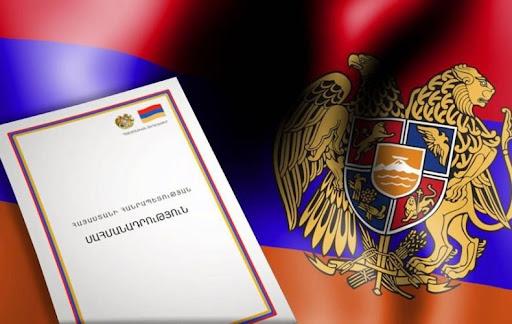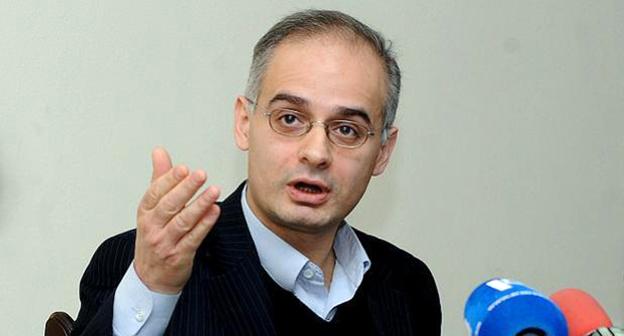Nikol Pashinyan: More talk than walk No real steps towards peace agreement
Armenian Prime Minister Nikol Pashinyan's "spectacular" statement on the need for a new constitution seems to have caused a stir in the "land of stones". Armenian pundits have suggested that the new constitution is not about Pashinyan, but about the Armenian authorities' intention to "finally destroy the identity and independence of the Armenian people".
Let's recall that last week Nikol Pashinyan, meeting with the Ministry of Justice, said that Armenia needed a new Constitution.
"The Republic of Armenia needs a new constitution. Not to change the Constitution, but to make a new one," he said.
It can be assumed that the fact that Pashinyan's idea of a new constitution inspires some optimism about the Armenian-Azerbaijani settlement is the reason why Armenian experts are "concerned" about it. They believe that the new constitution could, among other things, amend the preamble, which in its present form contains territorial claims to Azerbaijan.

The idea of a new constitution was raised by Pashinyan as early as 2021. But it remained at the level of declarative statements, which is not surprising given Pashinyan's "see-saw" politics. As we know, since coming to power Pashinyan has repeatedly shown the gap between words and deeds, changing his opinion with "enviable" frequency. Let's recall how he pathetically declared that "Karabakh is Armenia and that's it", called Armenia's "real borders" the 1920 borders, then referred to the 1991 Almaty Declaration to define Armenia's territory and called for the borders to be demarcated according to the maps of the USSR General Staff.
On the one hand, Pashinyan declares that Armenia recognises the territorial integrity of Azerbaijan along with Karabakh, but at the same time, he continues to delay the signing of the peace agreement and rants about Azerbaijan's non-existent claims to Armenia's territories. At the same time, it is obvious that the Armenian Prime Minister refers to the Almaty Declaration on the Karabakh issue.
For example, in his speech in the Armenian parliament in September 2002, Pashinyan stated that Armenia had signed and ratified the Almaty Declaration in 1991-1992, thus effectively recognising Karabakh as part of Azerbaijan. Pashinyan also referred to President Levon Ter-Petrosian's interview with Komsomolskaya Pravda in which he stated that Armenia had no objection to the granting of Karabakh the status of a large autonomy within Azerbaijan. Then, in October, Pashinyan told the Armenian Parliament that rejecting the 1991 Almaty Declaration (according to which Armenia and Azerbaijan recognise each other's territorial integrity) meant rejecting Armenian independence.
On January this year 15, at the meeting of the initiative group of the "Civil Contract" party, Armenia's Prime Minister reiterated Armenia's commitment to mutual recognition of territorial integrity under the Almaty Declaration of 1991.
Armenian society is still debating whether the Almaty Declaration regulates the "Karabakh issue".
Let's recall that a quadrilateral meeting was held in Prague on October 6, 2023. It was attended by Azerbaijani President Ilham Aliyev, Armenian Prime Minister Nikol Pashinyan, President of the European Council Charles Michel and French President Emmanuel Macron. A joint statement was issued at the end of the meeting, the main points of which were: "Armenia and Azerbaijan reaffirmed their commitment to the UN Charter and the 1991 Almaty Declaration, through which both sides recognise each other's territorial integrity and sovereignty."
Following this statement, the opposition accused Pashinyan of "surrendering Karabakh", since the Almaty Declaration implies recognition of CIS territories within their USSR-era borders. But there are pitfalls.
For example, in an interview with Sputnik Armenia last year, Levon Zurabyan, an aide to the first president of Armenia, Ter-Petrosian, revealed the details of the changes made by the Supreme Council of Armenia during the adoption of the Almaty Declaration.

Let us quote from the document, which conceals that Armenia refuses to recognise Karabakh as an integral part of Azerbaijan:
"During the ratification of the Almaty Declaration (February 18, 1992), the Supreme Council of Armenia adopted 10 reservations. According to the tenth reservation, the CIS will be open for accession not only to the former Soviet republics but also to the former autonomies of the USSR which had held national referendums on independence even before the Declaration on the Termination of the Soviet Union (December 26, 1991). In the second paragraph of the thirteenth article, after the words 'open to all countries of the USSR', the following words should be added: 'including those former autonomous entities of the USSR which prior to the adoption of the Declaration of the Supreme Soviet of the Soviet Union 'On the Termination of the Existence of the USSR' held a national referendum on the declaration of independence and on the basis of which the supreme executive body of the authorities of the autonomous entity applied to the CIS with a request for admission to its membership.
Armenia ratified the Almaty Declaration in 1992, which sent an unambiguous message that Karabakh can and should join the CIS as an independent state," Zurabyan said.
According to him, "it seems that the reservations with which Yerevan ratified the Declaration in 1991 simply don't exist for the current Armenian authorities".
"These reservations are hushed up, they only talk about the text of the Almaty Declaration and territorial integrity. From a legal point of view, Yerevan must revise the reservations of the Supreme Council, Pashinyan is obliged to go with the draft amendments to the parliament," Zurabyan stressed, adding that "if he doesn't do so, he will have no legal grounds to solve the Karabakh conflict within the framework of Azerbaijan's territorial integrity based on the Almaty Declaration".
Thus, the conclusion is that the Armenian leadership has led the country into a legal deadlock, from which the country can escape if Nikol Pashinyan neutralises the reservations of the Supreme Council of Armenia. Otherwise, the future leaders of Armenia will think that they have "reasons" not to recognise the territorial integrity of Azerbaijan. And so the "miatsum" idea may revive again.
Moreover, the Armenian prime minister will have to initiate a referendum on the adoption of a new constitution and exclude the reference to the declaration of independence. However, it remains to be seen whether Pashinyan will have the political will to move from words to deeds, to abandon once and for all the aggressive policy towards Azerbaijan, and to consolidate this principle by taking real steps towards a peace agreement....








